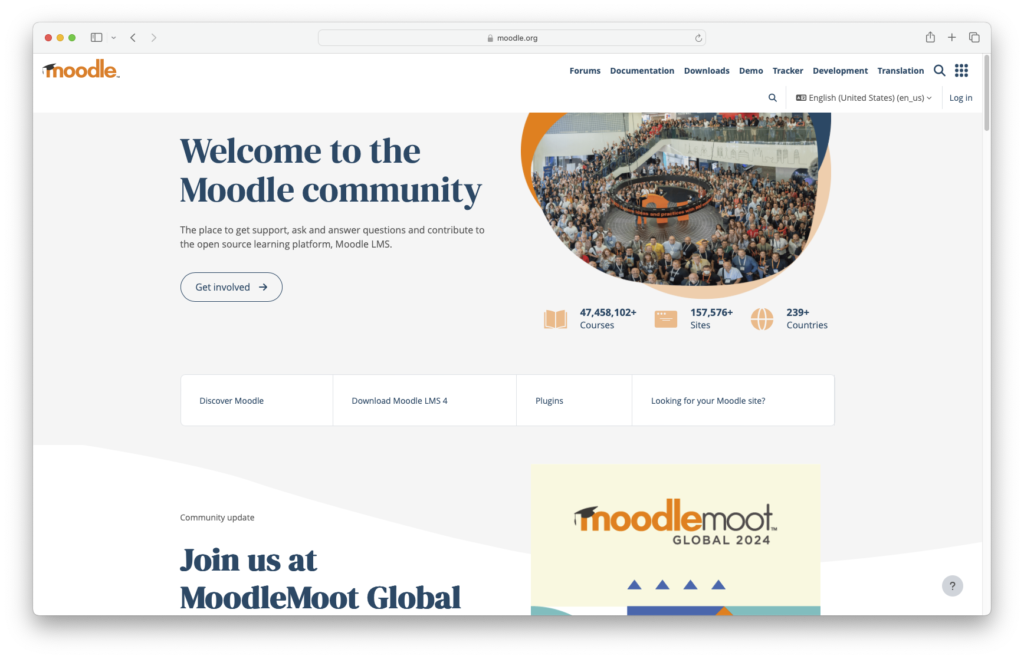Moodle is an open source LMS platform designed to provide educators, administrators, and learners with a secure organization system to create personalized learning environments.
Known for its flexibility and scalability, Moodle supports a wide range of educational activities and resources, making it ideal for institutions and organizations of all sizes.
In this article, we will explore the benefits of hosting Moodle as a Learning Management System, what to consider when searching for hosting providers, and the best hosting level for your eLearning website.
What are LMSs?
LMS, or Learning Management Systems, refer to the software tools and platforms used to create, manage, and deliver educational content and training programs online.
These technologies are designed to enhance the learning experience by offering a structured and accessible way to access educational materials and interact with instructors and peers, all through an online interface.
LMS vs CMS
Learning Management Systems (LMS) and Content Management Systems (CMS) are software that serve different purposes.
An LMS is specifically designed for education and training, offering tools to create, manage, and deliver courses, track student progress, and facilitate communication between instructors and learners. It focuses on the entire education process, including assessments, grades, and interactive learning activities.
On the other hand, a CMS is designed for creating, managing, and publishing content on websites. It is more general-purpose, used for managing digital content like text, images, and videos, and typically does not include the specialized educational features found in an LMS.
While a CMS can be used for educational purposes, it lacks the specific tools and functionalities that make an LMS effective for teaching and learning.
What is Moodle?
Established in August 2002 by Australian developer Martin Dougiamas, Moodle is a platform designed to facilitate online learning and teaching.
Over the years, Moodle has grown into a robust open source e-learning software, supported by a global community of partners and users. Today, certified Moodle partners and services worldwide leverage this software to develop and distribute course content for educational institutions, training programs, and more.
Moodle supports a variety of educational activities, such as:
Course Management: Use Moodle to create and organize online courses with different activities and resources.
Online Assessments: Administer quizzes, assignments, and exams with automatic grading.
Interactive Learning Modules: Seamlessly incorporate forums, collaborative learning modules, wikis, and more to enhance engagement.
Customizable Interface: Tailor the look and feel of the platform to match institutional branding.
User Management: Manage roles, permissions, and user enrollments easily.
Analytics and Reporting: Track learner progress and course effectiveness with detailed reports.
These features, among others, make Moodle a favored choice for schools, universities, and organizations seeking to provide online education and training.
Site owners also gain the advantage of accessing the Moodle community, where experts offer the latest updates, tips, and support for new users.
Finally, Moodle’s third-party software compatibility and vast plugin ecosystem allow for tailored customization to meet the unique requirements of various educational contexts.
Does Moodle Offer Hosting?
Although the official Moodle.org website offers cloud hosting services, they are usually small-scale cloud hosting solutions. These are suitable for smaller or less demanding sites.
In contrast, a hosting solution from a web hosting company offers enhanced performance, scalability, and control, making it a better choice for larger institutions or organizations with significant traffic. These options ensures a more reliable and efficient user experience, especially as your site expands.

How do You Host a Moodle Website?
Finding the right host ensures that your site runs smoothly, can handle high traffic, and provides a reliable experience for all users.
Choosing the appropriate hosting plan involves considering factors such as the number of users, the type of content, and the anticipated growth of your Moodle site.
Do You Need a Server for Moodle?
Yes, you need a hosting server to run Moodle or any other LMS solution. This can be a managed cloud server, Shared Server, Virtual Private Server (VPS Hosting), or Dedicated Server, depending on your site’s size and requirements.
The server must meet Moodle’s technical requirements, including support for PHP, a database like MySQL or PostgreSQL, and sufficient storage and bandwidth to handle your users and content.
Which Hosting is Best for Moodle?
The best hosting for Moodle depends on your specific needs and the size of your site. For small to medium-sized sites, managed Moodle cloud hosting or a VPS might be sufficient. These options provide adequate resources and flexibility for moderate traffic and less complex requirements.

However, for larger institutions or organizations with concurrent users and more complex needs, a scalable dedicated server is the ideal choice. These servers offer superior performance, scalability, and control, ensuring your lms site can handle a large number of users and extensive content without issues.
Hosting plans come in many shapes and sizes, from fully managed to bare metal, so make sure to select one that aligns with your site’s needs and anticipated growth. This will help ensure your learning platform remains efficient and reliable as it expands.
How Much Would It Cost to Host a Moodle Site?
The cost to host an eLearning site varies widely based on the hosting type and provider. Shared hosting plans can start as low as $5-10 per month, while VPS hosting can range from $20-100 per month. Dedicated servers or managed LMS hosting services can cost anywhere from $100 to several hundred dollars per month, depending on the resources and support required.
Beyond choosing the right hosting service, it’s essential to consider possible premium software integrations and plugins you might need for your Moodle website. These tools can greatly enhance the functionality and effectiveness of your e-learning platform.
For example, you might want to integrate tools for video conferencing, online assessments, and collaborative projects to support interactive learning experiences. Plugins for attendance tracking, grading, and analytics can help streamline administrative tasks and provide valuable insights into student performance. Additionally, integrating communication tools, like forums and messaging apps, can foster better interaction and engagement among students and instructors.
Final Thoughts
In conclusion, Moodle empowers educators worldwide with a secure and integrated online learning environment. As an open source software, it is celebrated as one of the top learning management systems, thanks to its network of Moodle certified partners, dynamic learning capabilities, and user-friendly administration.
If you are looking for a well-established popular learning management system, Moodle could be the right answer.

